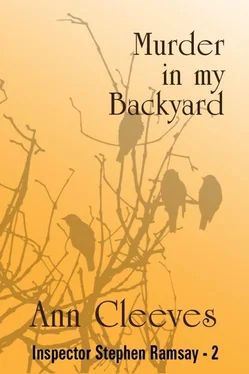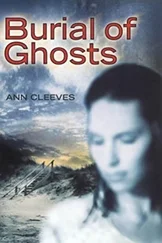Ann Cleeves - Murder in My Backyard
Здесь есть возможность читать онлайн «Ann Cleeves - Murder in My Backyard» весь текст электронной книги совершенно бесплатно (целиком полную версию без сокращений). В некоторых случаях можно слушать аудио, скачать через торрент в формате fb2 и присутствует краткое содержание. Жанр: Детектив, на английском языке. Описание произведения, (предисловие) а так же отзывы посетителей доступны на портале библиотеки ЛибКат.
- Название:Murder in My Backyard
- Автор:
- Жанр:
- Год:неизвестен
- ISBN:нет данных
- Рейтинг книги:5 / 5. Голосов: 1
-
Избранное:Добавить в избранное
- Отзывы:
-
Ваша оценка:
- 100
- 1
- 2
- 3
- 4
- 5
Murder in My Backyard: краткое содержание, описание и аннотация
Предлагаем к чтению аннотацию, описание, краткое содержание или предисловие (зависит от того, что написал сам автор книги «Murder in My Backyard»). Если вы не нашли необходимую информацию о книге — напишите в комментариях, мы постараемся отыскать её.
Murder in My Backyard — читать онлайн бесплатно полную книгу (весь текст) целиком
Ниже представлен текст книги, разбитый по страницам. Система сохранения места последней прочитанной страницы, позволяет с удобством читать онлайн бесплатно книгу «Murder in My Backyard», без необходимости каждый раз заново искать на чём Вы остановились. Поставьте закладку, и сможете в любой момент перейти на страницу, на которой закончили чтение.
Интервал:
Закладка:
Hunter said nothing and followed him out into the snow. Ramsay waited while the sergeant drove off angrily, then walked, as Alice Parry must have done the night before, down the drive towards the Otterbridge Road.
It was six o’clock and quite dark. As he reached the road the snow flurry ended and there was a thin, icy moon and a frost. Henshaw’s place was harder to find than he had expected, because out of the village there were no street lights and the houses were hidden behind hedges. He went through the first gate and walked unexpectedly into a farmyard. He disturbed a dog lying in an outhouse. It barked loudly and an outside light was switched on. A woman came to the door and shouted out to know who was there.
Ramsay, embarrassed by his mistake and not wanting to frighten her further, waited until she returned into the house and went back to the road without being seen.
The next drive led to Henshaw’s house. It curved pretentiously through borders of immature shrubs. There was a light outside the front door of the house and many of the windows were lit and uncurtained so Ramsay could see quite clearly how to approach. The bungalow was modern, the red brick unweathered, faced in places with local stone. In front there was a large, terraced garden, and set into one of the paved terraces was a swimming pool, empty, the blue tiles glazed with frost. In a typical Northumberland summer, Ramsay thought, it could hardly have been used. The garden must be exposed to the wind, cold even in sunshine. Attached to the house was a large garage built of the same violently coloured brick. The door was open and inside were two cars: a small Renault and a new and expensive Rover. Ramsay walked on, unnoticed, past the living-room window, the sound of his footsteps apparently muffled by the double-glazed panes. Inside a woman was setting bowls of nuts and crisps onto small tables. She was bent away from him to fill the bowls and Ramsay could not see her face, only her wide thighs covered by stretched blue silk. The Henshaws were expecting guests.
When he rang the doorbell, there was a two-tone noise, the same pitch as an ambulance siren from inside. Beyond the tinted glass he was aware of a bustle, a hurried preparation. They thought, perhaps, that he was an early guest and they wanted everything right before they let him in. At last a man opened the door to him. Henshaw was tall, heavily built, with a profile of a kangaroo. Despite his bulk and his age-he was in late middle age-his movements were decisive and self-confident. He spoke first before Ramsay could explain why he was there.
“Who are you?” he demanded. He wore an open-necked shirt and held a glass in his hand, but there was nothing relaxed about him.
“Mr. Henshaw,” Ramsay said. “ I’m sorry to disturb you. Perhaps I could come in for a while?” He showed the man his identity card. Henshaw studied it carefully, then stood aside.
“What do you want?” Henshaw said, not rudely, but making it clear he was not afraid of any policeman. “Someone came this morning to take a statement.”
“A few questions,” Ramsay said easily, carefully wiping his shoes on a mat just inside the door. A strip of transparent plastic matting led up the long hall. Mrs. Henshaw was obviously a house-proud woman and it would not do to antagonise her.
Without speaking, Henshaw led him through to the living room. Ramsay had expected Mrs. Henshaw to be there, but the room was empty. All of the large pieces of furniture had been pushed to the edge of the room against the walls, and the expanse of carpet, brightly patterned in swirling blues and greens, was broken only by several small coffee tables. At the time Ramsay thought the room had been arranged that way to accommodate the people the Henshaws were expecting, but when he visited again the room was just the same. It gave Ramsay the sense of a public building rather than a private home. It might have been the lounge of a smart, rather tasteless hotel.
The whole house was very hot. Along the wall was a stone fireplace and there was a gas fire, which simulated real flames. On the walls were several prints, chosen, it seemed, because their subjects were blue and green rather than because the Henshaws found them attractive. It was the sort of room Diana would have hated.
Again Ramsay was aware that he would have to conduct the interview with care. The fact that Henshaw owned the land behind his cottage coloured his attitude to the man. It was hard to remain objective.
“It’s my wife’s birthday,” Henshaw said suddenly. “We’re expecting guests. I’m going to have another drink. Would you like one?”
Ramsay shook his head. “This won’t take long,” he said. “The policeman who came this morning told you that Alice Parry was murdered last light.”
“Aye,” Henshaw said, then added reluctantly, “They’ll miss her in the village.”
He might have said more, but they were interrupted by Mrs. Henshaw, who stood for a moment in the doorway to be admired. Ramsay guessed she must have disappeared when she heard the doorbell to put on makeup, because her face had a waxy, coloured glow. She wore a suit in blue silk with a bow at the neck and frills at the sleeves, and her fat, fleshy feet were squeezed into high-heeled blue shoes. She smiled kindly and walked forward, arms outstretched.
“I’m sorry,” she said. “I don’t think we’ve met. You must be one of Colin’s friends.”
She had been told, Ramsay thought, to be on her best behaviour.
“No, no, woman,” Henshaw said impatiently. “ He’s a policeman. He’s here to talk about Mrs. Parry. Though God knows what it’s got to do with us.”
To Ramsay’s surprise Rosemary Henshaw’s eyes filled with tears. Her emotion contrasted sharply with Henshaw’s apparent indifference, and he wondered what significance that might have. She would be the sort, he thought, to cry easily.
“Poor soul,” she said. “ Such a shock to her family.” And she seemed genuinely concerned by her neighbour’s death.
“Did you know her well, Mrs. Henshaw?” Ramsay asked. Perhaps the women had been close friends and the awkwardness of the building dispute with her husband had come between them.
“No,” she said. “Not well. But she was kind. When we first came to the village, she made us welcome. She took me to the WI. Not all the old families were so friendly. It’s hard to settle in a new place, especially if you have no children.”
“Yes,” he said. “ It must be.”
Yet her sentimentality made him uneasy, and throughout the interview he treated her carefully, afraid of upsetting her again.
“Mrs. Parry came to see you last night,” Ramsay said. “You were the last people we know of who saw her alive.”
He looked at them, expecting some response, but there was none.
“She sold you some land,” Ramsay said. “ She came to see you to offer to buy it back.”
“Yes,” Henshaw said. “ She sold me some land.”
“Did you accept her offer to buy back the land?”
“No,” he said. “ Of course not.”
“Did you argue about it?”
“I never argue,” Henshaw said. “I explained to her the facts of business. I’ve already got prospective buyers for some of the houses. I’ve spent thousands drawing up the plans and putting them before the council. I couldn’t sell it now.”
“Is it true that Mrs. Parry only sold the land to you on the understanding that the houses you built would be small and inexpensive and available to local families?”
“No,” Henshaw said firmly. “That was a misunderstanding. I never gave any such commitment. Even Mrs. Parry accepted she’d been mistaken by the end of the evening.”
“Are you sure?” Ramsay asked. “ There was a protest meeting in the village yesterday afternoon and Mrs. Parry was very angry.”
Читать дальшеИнтервал:
Закладка:
Похожие книги на «Murder in My Backyard»
Представляем Вашему вниманию похожие книги на «Murder in My Backyard» списком для выбора. Мы отобрали схожую по названию и смыслу литературу в надежде предоставить читателям больше вариантов отыскать новые, интересные, ещё непрочитанные произведения.
Обсуждение, отзывы о книге «Murder in My Backyard» и просто собственные мнения читателей. Оставьте ваши комментарии, напишите, что Вы думаете о произведении, его смысле или главных героях. Укажите что конкретно понравилось, а что нет, и почему Вы так считаете.












